
by Mannahattamamma (UAE) | May 21, 2014 | 2014, Awareness, Cultural Differences, Education, Expat Life, Feminism, Girls, Government, Human Rights, Nigeria, Politics, UAE, USA, Women's Rights
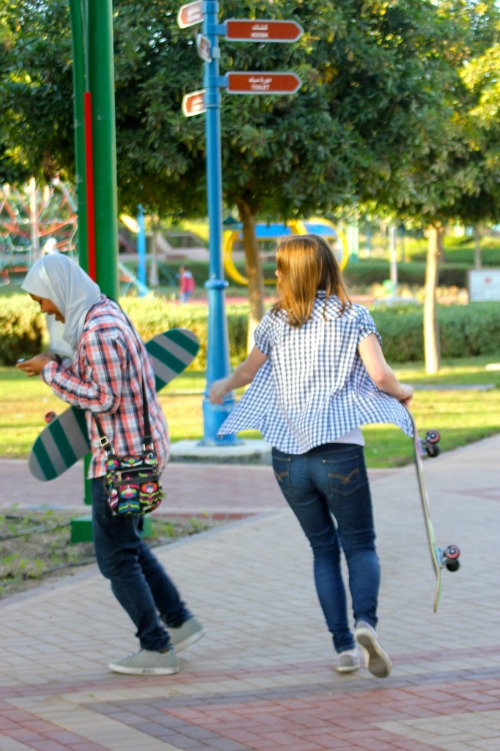
In March, I wrote a post in honor of Gloria Steinem’s birthday, in which I mentioned that when Steinem spoke at my college graduation way back in the 1980s, my friends and I had wished for a speaker who was more “relevant.” In our innocence, we believed that Steinem had won her fight; we were graduating from a women’s college and thought that fight for gender equality had been more or less won.
More than two decades later, I wish I could say that Steinem was irrelevant and that gender inequality is something we only read about in the history books.
When I wrote that post about Steinem, I was thinking about the Common Core curriculum, which relegates women’s contributions to history to the sidelines. Now, of course, we are all confronted with the horror that’s unfolding in Nigeria, and while the plight of those schoolgirls devastates me, it has become, in my mind, another instance in a long list of the ways in which groups (comprised mostly of men) attempt to score political points by seizing control of women’s lives. As an example, think about the Tea Party conservatives in the US, who prove their conservative bona fides in the United States by voting against support for Planned Parenthood, or Head Start, or universal kindergarten, or…
What is so scary about educating a girl? In the middle ages, accusations of witchcraft were often leveled against women who had amassed too much wealth or land, or who in some way differed from those around them. We teach our children that things like the Salem witch trials happened because “people didn’t know better” or because of “mass hysteria” but sometimes I wonder how far we have progressed since those days. What happens to women who challenge the status quo–or who have the potential to challenge the status quo? Don’t they still run the risk of being punished, whether literally or figuratively?
It’s funny to me now, but when I first moved to Abu Dhabi the two most obvious indications that we’d left Manhattan behind—besides the searing heat—were the adhan and the abaya-clad women: religion and covered bodies. I found the abayas more unsettling than the call to prayer, even as I sometimes envied the women their public invisibility. The longer we live here, however, my perceptions have changed so that I no longer see hijab as an automatic symbol of oppression or subjugation or second-class citizenry.
I would imagine, however, that as women here, we’ve all had moments where we’ve felt marginalized, silenced, lesser: the day I trotted down the sidewalk to get in a waiting cab and the cab driver chastised me by saying “women should not run, madam, I will wait, and you should walk.” Or when a guard at the border crossing into Oman looked over at the passenger seat where I was sitting (in long trousers) with one foot propped on the dashboard and told me “to put my foot down, sit like a lady, more properly, sit properly.” When that happened my first impulse was to laugh: surely he couldn’t be serious? But, of course, he was serious. I put both feet on the floor and looked at the map so that I didn’t toss out a few well-chosen swear words. (A general rule regardless of where you are: don’t swear at anyone, male or female, who is wearing a uniform at a border crossing.)
So yes, in that instance, I was silenced as I suppose I was by the cab driver too, who took it upon himself to offer some unsolicited advice. And yes, there is now a slight internal pause before I leave the house as I run through a kind of inner checklist about what I’m wearing: if short sleeves, a long skirt or pants, or vice versa (long sleeves, shorter skirt or shorts); do I have a shawl (equally for frigid air conditioning and bare shoulders); if I’m going to the beach, I make sure that my beach cover-up is more than a ratty t-shirt. There are days where I know I’ve failed the checklist and am too busy or late to care, but overall, I dress more modestly now than I used to and probably that’s not a bad idea: no one needs to see a fifty-year-old woman slopping down the street in cut-off shorts and a tank top.
Am I being repressed, or respectful? Does my feminism mean that I yell at the cabbie, keep my foot defiantly on the dashboard, saunter down the street in a halter top and tight jeans? Or, alternatively, does feminist politics remind us that silencing and the policing of women’s bodies happens—sadly—in almost every culture in the world, including the US? Without making light of the specifics of being female in this region, I’ve come to think of the issues facing women in this part of the world as being differences in degree, not kind, from the problems facing women in other parts of the world.
What do we, as women, do to help other women and girls find their voices–find our own? How do we create strength to silence those who would silence us?
This is an original post to World Moms Blog by Deborah Quinn in the United Arab Emirates of “Mannahattamamma.”
After twenty-plus years in Manhattan, Deborah Quinn and her family moved to Abu Dhabi (in the United Arab Emirates), where she spends a great deal of time driving her sons back and forth to soccer practice. She writes about travel, politics, feminism, education, and the absurdities of living in a place where temperatures regularly go above 110F.
Deborah can also be found on her blog, Mannahattamamma.
More Posts
Follow Me:


by Kyla P'an (Portugal) | Mar 24, 2014 | 2014, Awareness, Being Thankful, Childhood, Education, Eye on Culture, Family, Feminism, Inspirational, Language, Life Lesson, Parenting, Preschool, Relationships, USA, Womanhood, Women's Rights, World Mom Feature, World Moms Blog, World Motherhood, Younger Children
 From almost the moment our daughter came onto the scene eight years ago, we knew she had a strong personality. She was one of those incredibly alert and determined babies; the type you could tell was processing her surroundings and trying to figure out what to do about them.
From almost the moment our daughter came onto the scene eight years ago, we knew she had a strong personality. She was one of those incredibly alert and determined babies; the type you could tell was processing her surroundings and trying to figure out what to do about them.
While many babies and toddlers her age were delighted to be pushed in a swing, my daughter would have nothing to do with swings until she was old enough to figure out what made them go. She had no desire to be the passive recipient of being pushed, instead she wanted to be in control; she wanted to conquer it. She took the same approach with toys, puzzles and games. She was an early walker, a determined eater, and an all-around intense little thing.
My husband and I frequently got comments like: “boy, you’ve got your hands full with that one,” or “she’s going to keep you on your toes.”
As our daughter grew, by far her favorite activities involved sorting, organizing and problem solving. I have one vivid memory of her toddler music class, when she was just two years old. About three-quarters of the way through the class, the teacher put out a basket of instruments for the children to choose from and play along with. Our daughter, who was particularly fond of the little plastic eggs filled with beans—which she called shake-a’s—was determined to collect as many of them as possible. Driven by this singular motive, she went around the room delivering alternate instruments to fellow toddlers and parents alike. Anytime she encountered an individual who already had a shake-a, she’d attempt to persuade them with an alternate instrument in exchange until she had gathered a significant cache.
During these displays of self-assured behavior and go-get-‘em spirit, I often found myself shrinking into the background, hoping other parents wouldn’t fault me for having such a pushy, precocious child. At this particular music class, however, a parent approached me afterwards and commended me for having such a “strong child with clear leadership potential.” With her few words of encouragement, this parent liberated me from my deep mommy guilt about having a child with drive.
I was in constant conflict because, even though I am a child of the 70’s—a time when many of our mothers here in the US were breaking down stereotypes and entering the workforce en masse—I was raised by my father, who came from an old-world upbringing and had old-fashioned views of how boys and girls should behave.
I am reluctant to admit that, rather than celebrating my daughter’s inherent leadership qualities, I labeled her as “bossy” and occasionally even criticized her for being too demonstrative.
Bossy, a word inferring that someone is behaving “boss-like,” should be a compliment heralding someone’s leadership skills but ironically, instead it criticizes her for it. It’s a label reserved primarily for girls. You rarely hear it applied to boys. A little girl on the playground, organizing kids into teams and assigning them roles will quickly be knocked down a few rungs by calling her “bossy,” whereas a little boy taking the same actions might be respected and followed.
I’m ashamed to admit, even I supported this stereotype. I was concerned my daughter was too confident interacting with adults, leading activities and organizing groups. I was concerned she wasn’t “girly” enough, lacked empathy and a gentle, nurturing-side. As a modern, liberated and independent woman myself, I still didn’t want her peers to ostracize her or put her down.
Why was I struggling between nurturing and diminishing my daughter’s inner boss? Why was I uncomfortable with her being a leader, or overly-confident or intensely goal oriented? What could I do to help raise this new generation of girl-leaders?
Two weeks ago I got some reassuring answers. They were in the Wall Street Journal, on a full-page, front-of-section article titled, “Don’t Call Us Bossy.” And the women giving the encouragement were the Chief Operating Officer of Facebook, Sheryl Sandberg, and the Chief Executive Officer of Girl Scouts, USA, Anna Maria Chavez.
Sandberg and Chavez’s goal is to redirect our thinking about the way girls lead. To relabel our vocabulary about girls’ take-charge behavior. Instead of bossy behavior, recognize it as executive leadership potential, like CBS television anchor, Norah O’Donnell does. Instead of discouraging ambitious goals, support girls to recognize their inherent ability to achieve whatever goal they set out for.
I think the world would be a very different—and frankly far more pleasant—place to live in if there were more “bossy” women in charge.
Let’s take a stand to have more female bosses in the workplace; Here’s to raising our girls to be the leaders they are capable of being, not the followers our lexicon makes them feel they are supposed to be!
Did anyone ever call you “bossy” growing up? Do you see these qualities in your own child? How do you feel about assertive and confident girls?
For ways to encourage leadership in girls, visit LeanIn.org and BanBossy two of the movements supported by Sheryl Sandberg, Ana Maria Chavez and Girl Scouts, USA.
This is an original post to World Moms Blog from our managing editor and mother of two, Kyla P’an.
The image used in this post is credited to Pat Moore. It holds a Flickr Creative Commons attribution license.
Kyla was born in suburban Philadelphia but spent most of her time growing up in New England. She took her first big, solo-trip at age 14, when she traveled to visit a friend on a small Greek island. Since then, travels have included: three months on the European rails, three years studying and working in Japan, and nine months taking the slow route back from Japan to the US when she was done. In addition to her work as Managing Editor of World Moms Network, Kyla is a freelance writer, copy editor, recovering triathlete and occasional blogger. Until recently, she and her husband resided outside of Boston, Massachusetts, where they were raising two spunky kids, two frisky cats, a snail, a fish and a snake. They now live outside of Lisbon, Portugal with two spunky teens and three frisky cats. You can read more about Kyla’s outlook on the world and parenting on her personal blogs, Growing Muses And Muses Where We Go
More Posts - Website
Follow Me:

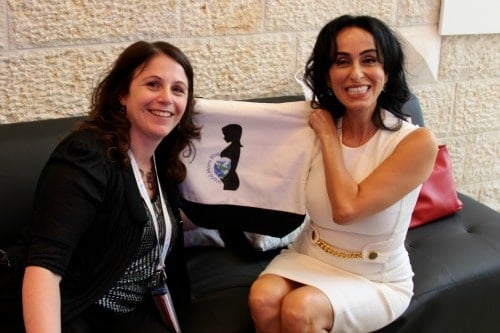
by Susie Newday (Israel) | Jul 31, 2013 | 2013, Culture, Eye on Culture, Feminism, Inspirational, Interviews, Israel, Life Lesson, Music, Parenting, Susie Newday, Uncategorized, World Events, World Interviews, World Motherhood
When you’re offered an opportunity to interview the biggest female singing sensation in your country, you jump at it. Last month during the Israeli Presidential Conference I was lucky enough to meet and interview Rita Jahan-Foruz a singer known simply as Rita.
Rita was born in Tehran, Iran and emigrated to Israel at the age of 8. Through hard work and lots of talent she became Israel’s most successful singing artist. For the last 25 years Rita has had an illustrious career both in Israel and abroad. Her latest album “My Joys” is entirely in her native language of Pharsi. That album has become a big seller on the black market in Iran where it is forbidden, along with all other Western music. Some say that Rita’s album would go gold in Iran if it wasn’t banned.
I waited in the VIP room for the interview to start, and I sat there becoming increasingly more nervous as I watched other people interview Rita and a host of other interesting people who were speaking at the conference. I did chuckle a bit to myself when Weili Dai, a top female entrepreneur and the CEO of Marvell (herself an amazing, friendly and gifted woman), came over to have her picture taken with Rita. It wasn’t the photo op that made me chuckle, it was the fact that right before the photo was snapped both of them fluffed their hair. It seems to be a universal quirk all women around the world have before being photographed. I was also quite in admiration how both of them managed to be on their feet all day in their beautiful but really high heels.
Okay, shallowness now aside.
Right before our interview started, a young man who was a waiter at the event came over, sat down on the couch next to Rita and started talking to her. It was spontaneous on his part and graciously received on her part. It was only after I had tweeted a picture of them talking and commented on how friendly Rita was that someone tweeted me back saying that the waiter is connected to an organization called OneFamily (a non-profit organization that rehabilitates, reintegrates and rebuilds the lives of Israel’s thousands of victims of terror attacks) which is a cause dear to Rita’s heart.

When it was my turn I came over, said hello and introduced myself. I sat down trying to look put together, which I can tell you is not an easy task when you are lugging a knapsack, a telephone, a tape recorder, notebook and ipad.
Before I even started asking questions, I gave Rita a World Moms Blog tote bag that Jennifer Burden, the founder of World Moms Blog, had sent me to gift to her. Rita loved it, and right away started putting all her things into it.
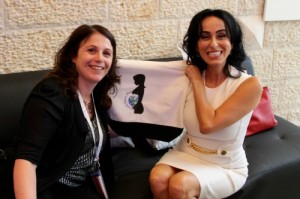
I then handed her a little gift from myself, a keychain that said in Hebrew “Music is the language of angels.” She loved that too, and you could see that her reaction was genuine and not just polite. She right away pulled out her keyring from her bag. It had lots of keys and other keychains, including one with a picture of her daughters and she clipped my gift right on. She even proudly showed it off to others.
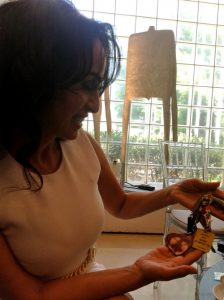
As I was about to start asking her questions, I blurted out, “I’m a bit nervous.” She looked at me in surprise and said, “Nervous? Really? Why?” as if the concept was completely foreign to her that someone would even be nervous speaking to her. That put me completely at ease, and the interview, or should I say more of a conversation, started. When I watched some of her videos later I was able to once again see her natural friendliness and charm shine through. This video of Rita recording one of her songs in Pharsi is a good example of her being down to earth and approachable.
I offered to do the interview in English or Hebrew, but Rita wanted to practice her English so we started off in English but moved back and forth. I could tell how passionate she was about certain subjects (which was often) because that was when she moved back into Hebrew in order to be able to express herself so much more freely.
Susie: World Moms Blog represents mothers from around the world. Right now we represent 20 countries including Morocco, Saudi Arabia, UAE, Egypt and many others. We write about motherhood, culture, social good, about connecting people through what they have in common.
Rita: Wow. Do you have a writer from Iran?
S: No, but if you know someone, we would love to have them on board.
I think that what you’re trying to do with music is what we at World Moms Blog are trying to do through writing, which is to bring the world together one person at a time. (Rita nodded her head at that.)
Do you see yourself as an ambassador of peace between all countries or just between Israel and Iran?
R: I think with my own existence I represent the Iranian and Israeli connection but I would love to represent as much as I can. I think that as women we have a unique way of connecting.
The male and female species are in essence two opposites. You need them both in the world, like Ying and Yang, day and night. It’s a little bit like our reproductive organs. The male behavior, like the male anatomy is surging forward, conquering, moving on with energy that is outward facing.
A woman’s energy is like our wombs. It’s meant to contain/include* and to embrace what there is no matter what. We first embrace and bring things close. We need to be able to see the strength in this, we need to influence and to realize that the place of “containing/including*” others is our strength.
It’s like a a mother who is always the center of the house. Everyone in the family comes and goes, they go a bit nuts. They cry but in the end they always come back to the middle, to the center and the nature of women is the center.
We are mothers and what happens to our children, and to the world they will inherit is important to us. We have to use our natural strengths of connecting to make sure we do what is best for them.
(*There is no great English translation for the word Rita used. The closest I got was contain but it is somewhere between contain and include with maybe a little bit of absorb.)
S: What would you suggest to women to do in order to empower themselves?
R: Not everyone can sing or dance or act or write books, but I think that each and every one of us can influence by connecting. One person connects with another and they connect with someone else from someplace place and so on. We all have to try to connect to others.
(Note: Rita is not only the best selling Israeli singer of all time, she also dances, acts and has published a children’s book. She received The Israeli Academy Award for Best Actress in 1989 for her role in The Thousand Wives of Naftali Siman-Tov, as well as the 2011 Best Actress award at the San Francisco International festival of Short Films for Ben returns Home. Her children’s book “The Girl With A Brave Heart” has been translated into English from Hebrew.)
S: That is something really close to my heart. That’s how I got to blogging, by connecting with other mothers though a forum overseas, getting to know them and having them get to know me. We were all from different cultures but we were all mothers.
One of the things which touched me was listening to you talk about how you got the love of music from your home and that your parents were very supportive of you.
R: They were supportive in their love. They didn’t understand what I was doing, going from class to class, learning acting, dancing and taking voice lessons. They didn’t understand anything about that.
S: But what I’m hearing from you is that they didn’t criticize either?
R: No they didn’t.
S: You have two daughters ages 12 and 21, right? Do you think parent/child relationships today are different then they were when you were growing up?
R: Of course. Of course. I think that back then children were not so important in what they said. They were children. Nowadays, we don’t look at children as children. They are much more important than us. We listen to them more, we are more attentive and sensitive to them. I don’t think it was like that back when I was growing up. Kids were kids. You ate and grew. No?
S: I don’t know. What I see is that kids these days are less connected to their parents than we were, at least on a daily basis. They have a lot more outlets than we had.
R: The world is changing. In this age of the television and computers, the “outside” world has more influence whereas once the “inside” world, the inner circle, had more influence.
I think that these days we give our kids so much love that maybe we spoil them too much. We are more protective of them than anyone was of us. Right?
S: I think that these days we have more to protect our children from.
R: Yes, you’re right.
S: Has fame affected your family relationship and your relationship with your daughters?
R: Of course.
S: In what ways?
R: I’m not talking about fame because fame didn’t affect anything. I am talking about not having the privacy to go for instance with my daughter to the beach. People constantly come and want to take pictures with you and you can’t possibly have privacy with your family and children outside of the house. Of course it’s something that affects you.
S: What do your children have to say about it?
R: I think they don’t like it. They are much more sensitive to people passing by and looking at them or photographing them. They are very sensitive to that.
S: Do you think your children feel any advantages of your fame?
R: Of course. They come to the concerts. They have a different type of life. Once, my daughter Meshi came home laughing at a question that someone had asked her. “What is it like to be Rita’s daughter?” She said I don’t know, I haven’t experienced anything else.
S: It sounds like she has a great sense of humor.
R: Yes, she’s amazing.
S: What is your wish for world mothers?
R: I wish for all us mothers to have the power, strength and wisdom to protect our children until they themselves have the ability to protect themselves.
I think that the most painful thing in the world is knowing that children are raped or abused and that we are not really able to protect them. That is what I am most sensitive to, knowing that somewhere out there, there is a child that is helpless and there is no one to protect him.
S: Sadly, things like that happen even to children who have people looking out for them.
R: It’s even worse when the people who are supposed to be protecting the children are the ones who do terrible things and do them harm.
S: Do you have one particular defining moment that you remember as a child?
R: Yes, yes. In Iran, my mother had a hair salon in the house. All kinds of women used to come to her. Once, a women who was almost completely bald came. All she had was wisps of hair. My mother shampooed her hair and while she was doing her hair she kept telling her you’re so beautiful, look how beautiful you are, you’re so wonderful.
I was 6, and my sister who is four years older than me was 10. My mother was working in our bedroom like she always did because that was also her work room. When the woman left, my sister said to my mother, why are you such a liar? How could you tell her she was beautiful? She was bald, she almost didn’t have any hair.
My mother then asked my sister, why do you think I was lying? My sister said, you told her how beautiful she was, what beautiful eyes she has, but she was bald. My mother then gently asked my sister, but did you look at her eyes? Her eyes were very beautiful.
And that’s the lesson I quietly learned there.
S: It seems to me that that is exactly what your book teaches, to look past the outer and see the beauty and kindness that is in each person.
R: That’s what I learned my whole life from my mother. When she looks at someone, first and foremost she looks for what’s beautiful in the person. That’s the way she sees people. That was a very big life lesson for me.
Every time I tell this story I still have goosebumps.
S: I find it amazing that I didn’t even know about your book until one of the other World Mom Bloggers told me that you had written one and it had been translated to English.
R: The book is gaining incredible momentum.
S: It should. It’s a great book with a great message and great illustrations.
(Note: The book is called The Girl With a Brave Heart. I read it in Hebrew and I love the many messages in it including the fact that people don’t always know how to ask for what they need and that we should let our hearts lead the way.)
Of course that’s when I pulled out the two copies of her book that I bought along for her to sign. I handed her a pen but she searched her bag because she has a special marker for signing books.
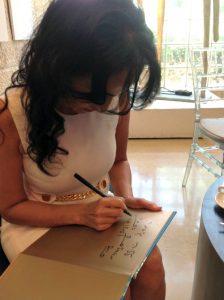
There is something so nice about talking to someone who is famous, who has performed for world leaders, who has bought so much joy to others through her music, yet still makes you feel no less important than she is. Maybe one day I will get to speak to her again because I really enjoyed our conversation.
I really hope Rita has unparalleled success in bringing people and countries together through her music. My wish for her is that one day she will get to perform in her native country of Iran, something that will mean that peace and acceptance has finally come to our world.
Before Rita’s performance at the UN’s main assembly hall, secretary-general Ban Ki Moon told Rita that many revolutions started from music and that it’s a place that politicians can never enter.
What do you think? Do you think music and musicians can help bring about change and be a conduit for peace?
This has been an original post to World Moms Blog by Susie Newday of Israel. You can find her positive thoughts on her blog, New Day New Lesson.
Photo credit to the author.
Susie Newday is a happily-married American-born Israeli mother of five. She is an oncology nurse, blogger and avid amateur photographer.
Most importantly, Susie is a happily married mother of five amazing kids from age 8-24 and soon to be a mother in law. (Which also makes her a chef, maid, tutor, chauffeur, launderer...) Susie's blog, New Day, New Lesson, is her attempt to help others and herself view the lessons life hands all of us in a positive light. She will also be the first to admit that blogging is great free therapy as well. Susie's hope for the world? Increasing kindness, tolerance and love.
You can also follow her Facebook page New Day, New Lesson where she posts her unique photos with quotes as well as gift ideas.
More Posts - Website
Follow Me:





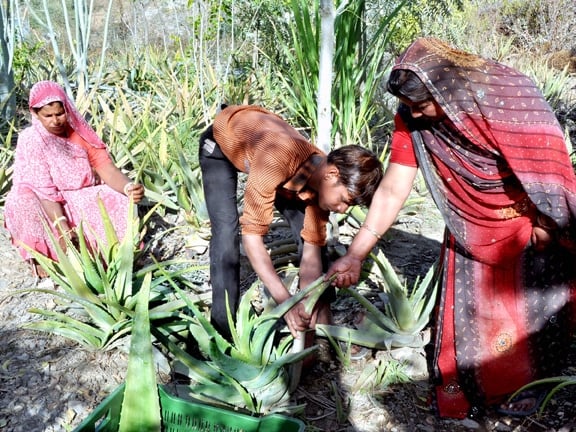
by Purnima Ramakrishnan | Jul 23, 2013 | Casting a Wider Net, Economy, Education, Feminism, Government, Human Rights, Humanity, India, Inspirational, International, Motherhood, Nature, Purnima, Social Good, The Alchemist, United Nations, Women's Rights, World Moms Blog, World Voice
A couple of weeks ago, we featured a remote village, Piplantri (Western India) on the Gates Foundation. Piplantri is a model village, whose actions of change have been very well received all over India.

Aloe Vera products from the small scale industries
They plant 111 trees for every girl child who is born, create a fixed deposit of INR 31,000 (approx. USD 620) in her name which attains maturity when she is 18 years old and chalk up a legal agreement between the parents of the girl child and the government that they won’t get their girls married off before she is 18 years old. They also have Aloe Vera industries in which the women of the village are employed. So they have achieved MDGs #3 (promote gender equality and empower women), #4 (reduce child mortality), and #7 (ensure environmental sustainability) at one go. Today on the blog, I would like to introduce Mr. Shyam Sundar Paliwal and his wife, Anita, who were the pioneers of this change action in their village. Anita is 42 years old, and she got married after she finished her 12th grade. It was an arranged marriage and the couple were happy.
Their first daughter Kiran was 18 years old when she passed away. She died due to dehydration. That was the turning point in their life, and they vowed to make lives of others happy.
They also have another daughter Hemanshi (22) and a son Rahul (15) who is in 10th grade. Hemanshi is married and has a child, too.
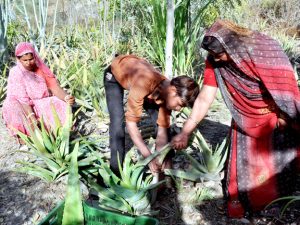
The women of the village tending Aloe Vera
Anita recalls that when she came to her in-laws place after she got married, the first lesson she received from her father-in-law was to plant banana saplings such that they bear fruits during the rainy season and then plant mango saplings around the banana trees. Banana trees absorb water during the monsoon and transfers this water to the mango trees through its roots during the arid summer season. She says she has stuck to this piece of advice to date in her village and ensured that her villagers follow such age-old farming wisdom.
Anita, who is the wife of the ex-sarpanch (ruling political head) of the village, Piplantri, is a very active community member. She is a Zila Parishad Member (Elected person of the district council). Her husband has always been supportive of her as a woman and wants her to do her best for her villagers. He has never restricted her in any way. Though she is more educated than him, he has never been jealous of her, but has only encouraged her and furthered her growth and development as an active member of their society and community. She says, if only all women of the world gets a husband like Shyam, the women of the world will be better off and we would not be speaking of women’s rights here.
Shyam Sundar won the panchayat elections in 2005 and he says he first wanted the people who worked in the government offices to be comfortable. He installed the first AC in the office, brought in some comfortable furniture and ensured that people in all echelons of the society were treated equally. (In rural India, at times, the upper caste people are given more respect and sit on chairs, whereas the lower caste people are treated shabbily and sit down on the floor. Read more about the Evils of Caste system in India here). He said, he worked on the psychology of the ruling body to make them happy and comfortable. He says, only if they are happy, they would start working on reform measures and help provide for the remaining villagers. He, at his own expense, made the offices a comfortable place to work and conducive to provide better results.
He started small. In this difficult water shortage era, he diverted the waste water from all houses/offices towards the fields. Better water conservation was ensured. If waste water does not stagnate anywhere, there would be no mosquitoes and no dengue and fewer diseases. So, he solved primarily problems with simple, cost-effective solutions.
He installed drinking RO water systems in schools. Brought in furniture for the students and made the public schools better than the expensive private schools. People started flocking towards government schools. He raised awareness slowly and in a small way, which evolved out.
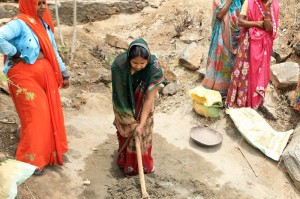
Mrs. Anita Paliwal working on the Water Harvesting Structure
He started rain water harvesting with the help of government. He built canals. He used the women of the village who were unemployed. To the left is a picture of Anita, who at times does not hesitate to get into the fields with a mean sickle. She and her husband were instrumental in starting the water harvesting structure of the village. In most of his welfare activities 90% of the employed are women and 10% alone are men. Women of the village have been blessed indeed to have him there, says Anita. In addition to 25,00,000 Aloe Vera plants, there are 10,000 rose shrubs which are also used in small-scale industries for toiletries and medicinal supplements. Women are employed in all of these schemes.
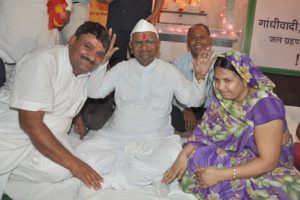
Mr. Shyan Sundar Paliwal and Mrs. Anita Paliwal with Anna Hazare
He started the Kiran Nidhi Yojna with the 76-year-old International Social Activist, Anna Hazare to ensure that no girl child is married off before 18 years old. This man who himself did not study in a college, ensures that all girl children in his village get a college degree. He also nudges the parents to get their girls married off in collective wedding, so that money is conserved and better utilised for other public welfare schemes or for their own savings. This scheme also granted government land to the parents in return for planting 111 trees on the birth of their daughter in that land, and tending to it to fruition before their girl child is 18 years old. On the death of any community member, the family is requested to plant trees again.
He says this again works on their psychology. The girl children treat the trees as their own brothers and sisters. After all, the saplings were planted on the day of their birth. And the parents get emotionally attached to the trees which came into existence on the day their family member was born or died. They then take care of it as a family member, and would under no means cut it down. He says, it is all in the hearts of the people. If people get involved with their hearts, anything is possible. He made people to get emotionally attached to nature and trees and the earth.
I learnt something new from Anita and Shyam that day – Ecofeminism. It is such a beautiful concept. Women and nature have been connected since time immemorial and this couple have harnessed it.
After all, he who was not highly educated could work on such things and make that beautiful village into a heaven, he says, the whole world could change too. And we would have no need to talk about the MDGs or uplifting of any downtrodden society/community.
When asked how he felt when his village was showcased by the Gates Foundation on their Blog, he gushed with happiness and pride. The district collector and Panchayat officials were so excited, too, he said. But his only complaint was that he could not get a hard copy of the magazine which he could show his villagers. He is so proud like a father, like the father of the heaven he created.
He also invites donation to his Kiran Yojna Scheme for the fixed deposit of INR 31000 of every girl child born in his village. He invites the contributors, readers and fans of World Moms Blog to make a trip to Piplantri. He wants people to embrace such change and for them to build upon it to suit their own society, and community.
This is an original post to World Moms Blog by Purnima, our Indian mother writing from Chennai, India. Her contributions to the World Moms Blog can be found here. She also rambles at The Alchemist’s Blog.
Photo credit to Piplantri.com
What do you think about the traditions put in place to support girls and women in the community of Piplantri?

by Natalia Rankine-Galloway (Morocco) | Jul 17, 2013 | Body Image, Cultural Differences, Culture, Expat Life, Feminism, International, Life Lesson, Living Abroad, Morocco, Religion, Saudi Arabia, Sexuality, Travel, Uncategorized, World Motherhood
 Recently, my boobs took a trip to Jordan. At least it seemed at the time that the rest of me was just along for the ride. Never had my cleavage gotten so much attention; never had it occupied my thoughts so completely.
Recently, my boobs took a trip to Jordan. At least it seemed at the time that the rest of me was just along for the ride. Never had my cleavage gotten so much attention; never had it occupied my thoughts so completely.
Having lived in Morocco for almost a year, I thought I knew how to strike the proper balance….somewhere between my usual, US appropriate signature style and a more modest décolletage that I felt was an appropriate concession to my host country’s social norms.
This balance was clearly off-kilter for Jordan. My ensembles were getting more attention from the male Jordanian population than a Britney Spears get up. Given that I have been a little sensitive about my dwindling cup size since giving up nursing my son, I was momentarily flattered….before being sincerely uncomfortable and confused.
I knew in theory that one country in the Middle East or North Africa would not necessarily adhere to the same standards of dress for women as the next, just as various areas or social classes within Morocco dressed worlds apart.
(more…)
Natalia was born a stone's throw from the Queen's racetrack in Ascot, UK and has been trying to get a ticket to the races and a fabulous hat to go with it ever since. She was born to a Peruvian mother and an Irish father who kept her on her toes, moving her to Spain, Ireland and back to the UK before settling her in New York for the length of middle and high school. She is still uncertain of what she did to deserve that.
She fled to Boston for college and then Washington, D.C. to marry her wonderful husband, who she met in her freshman year at college. As a military man, he was able to keep her in the migratory lifestyle to which she had become accustomed. Within 5 months of marriage, they were off to Japan where they stayed for a wonderful 2 and one half years before coming home to roost. Baby Xavier was born in New York in 2011 and has not slept since.
A joy and an inspiration, it was Xavier who moved Natalia to entrepreneurship and the launch of CultureBaby. She has loved forging her own path and is excited for the next step for her family and CultureBaby.
Natalia believes in the potential for peace that all children carry within them and the importance of raising them as global citizens. She loves language, history, art and culture as well as Vietnamese Pho, Argentinian Malbec, English winters, Spanish summers and Japanese department stores...and she still hopes one day to catch the number 9 race with Queen Liz.
You can find her personal blog, The Culture Mum Chronicles.
More Posts
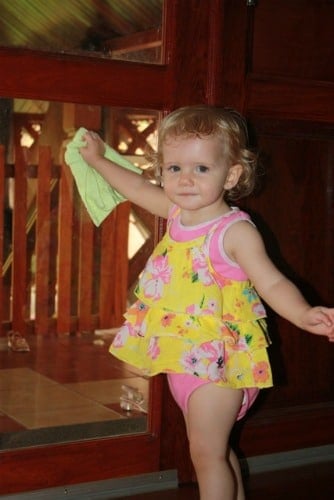
by World Moms Blog | Jun 8, 2013 | Feminism, Motherhood, World Motherhood
Today we’re sharing a post from a World Mom living in Laos! If you’re interested in telling your motherhood story on World Moms Blog, email us at contribute2@worldmomsblog.com!
This first “World Mom Feature” is by Miss Pip of Laos…

“Equal to None”
A concerned citizen, upon realizing we had three daughters, recently offered to take my partner ‘upcountry’ to the village to meet the local witch doctor. Apparently, this particular Shaman was able to supply an herbal concoction that would guarantee us a son.
(For the record, we are not having any more children. We are very happy with the ones we already have.)
I am fascinated by how often people feel compelled to tell me that my family is incomplete because I don’t have a son. They remind me that, despite over 100 year of feminism, my three children and I are still considered “LESS THAN” because we were born without a Y-chromosome.
Becoming a mother has enriched my life. I love my daughters, unconditionally. I treasure the opportunity to guide them towards adulthood. Nonetheless, becoming a mother has been a struggle. I have had to fight some very personal demons and have been rather lost and confused along the way. Fundamentally, I have had to redefine myself within the context of being a “Woman”.
Until I had children, I naively defined myself as a “Human” first and a “Woman” second. I studied Feminist Theory at University, but I kind of blew off any notion that MY life was influenced by the patriarchy. I was a kick-ass individual, and I lived my life on equal terms with anyone else.
But becoming a mother made me realize that, in reality, I still live in a world defined by and dominated by men, and my life decisions have been profoundly influenced by that.
My partner and I have been together for 15 years. We got our first jobs together, moved in together, paid the rent together, traveled together – as equals. I was hell-bent on our roles in the relationship being defined equally even though that meant that sometimes, after we have paid our ‘equal’ share of the bills, he still had money to go out, and I didn’t. (Interestingly, even at minimum wage he was paid more than I was!) We shared the chores equally. I NEVER ironed his clothes. I was a proud, fierce and independent woman with my own life and my own career.
But over time things started to change. My business ventures, which had sustained us adequately in early adulthood, became less profitable than his career. He was offered the opportunity to move, first interstate and then overseas. I couldn’t justify preventing his progress just because I was wanted to pursue what was, quite possibly, a pipe dream. Also, I loved him. I was proud of his success. I choose to support him, to follow him. It was my choice.
I could still work, I told myself. I was strong and resilient and very capable. But we moved a lot and, eventually, we reached the point where my income could no longer be relied upon. I was, I realized, financially dependant on my partner.
Becoming a Mother
Then, somewhere along the way, we decided to have children. We talked about it, at length. Having children did not mean ME taking on the only responsibility for caring for the kids and the household. I wanted to work. We would share the responsibilities. Equal opportunity parenting. Yep, sure, sounds like a plan, I am on board, let’s do this.
… Needless to say, that is not quite how things worked out.
My partner now works longer hours and spends more time away then he ever did before we had children. He sometimes feels overwhelmed by what he perceives to be his duty to support and provide for his family.
I now earn less money and spend more time in my house than I ever did before children. I regularly feel overwhelmed by my assumed role as the primary carer, wet-nurse, cook, cleaner, manager, taxi driver, nurse, psychologist, nutritionist, disciplinarian in our family.
My family IS the Perfect Little Patriarchy!
But wait… no it’s not perfect… I forgot… I don’t have a son!
I have three complicated, passionate, articulate, intelligent, determined, manipulative, magnificent GIRLS.
Raising Daughters
One day, my little girls are going to grow up to be WOMEN, how unfair for them and how wonderful for them. They are going to grow up to be HUMANS, what an opportunity for them.
I am their mother and, for me, it’s complicated.
• Shouldn’t I be an example to them, a strong, female role mode
• Have my choices perpetuated the status quo?
• Will they grow up with notions of ‘what women do’ that will go on to influence them as they grow into women themselves?
I am their mother and, for me, it is simple.
• I will practice compassion, identify inequality and I will teach them to do the same. I will continue to grow as a woman and a human because I owe it to them to be the best person I can be.
• I will be proud of my choices – they have given my daughters, a loving and safe home.
• I will encourage my girls to embrace their womanhood. I will teach them that with hard work and dedication they can achieve anything they set their minds to. I will show them they can be the change.
I am their mother. They are my daughters. They are ‘MORE THAN’ anything.
 This is an original post to World Moms Blog by Miss Pip. She lives in Vientiane, Laos with her partner, their three incorrigible daughters (aged 5.5 years, 4.5 years and 16 months) and two well-traveled cats. She says that she used to be fabulous! (We say, she still is!)
This is an original post to World Moms Blog by Miss Pip. She lives in Vientiane, Laos with her partner, their three incorrigible daughters (aged 5.5 years, 4.5 years and 16 months) and two well-traveled cats. She says that she used to be fabulous! (We say, she still is!)
Last year Miss Pip turned forty. She says, “That sucked! I had no idea who I was or what made me happy. I was ashamed of who I had become and conflicted about being a mum. It was all very boring, very depressing and was making me, and the people who loved me, miserable.”
So she decided to change. Miss Pip decided to let go of the past, accept her present and embrace a future where SHE IS the fabulous version of herself that she knows she can be. You can also find her on her blog, 44 and a Fourth.
Photo credits to Miss Pip.
World Moms Blog is an award winning website which writes from over 30 countries on the topics of motherhood, culture, human rights and social good. Over 70 international contributors share their stories from around the globe, bonded by the common thread of motherhood and wanting a better world for their children.
World Moms Blog was listed by Forbes Woman as one of the "Best 100 Websites for Women 2012 & 2013" and also called a "must read" by the NY Times Motherlode in 2013. Our Senior Editor in India, Purnima Ramakrishnan, was awarded the BlogHer International Activist Award in 2013.
More Posts

























 This is an original post to World Moms Blog by Miss Pip. She lives in Vientiane, Laos with her partner, their three incorrigible daughters (aged 5.5 years, 4.5 years and 16 months) and two well-traveled cats. She says that she used to be fabulous! (We say, she still is!)
This is an original post to World Moms Blog by Miss Pip. She lives in Vientiane, Laos with her partner, their three incorrigible daughters (aged 5.5 years, 4.5 years and 16 months) and two well-traveled cats. She says that she used to be fabulous! (We say, she still is!)


